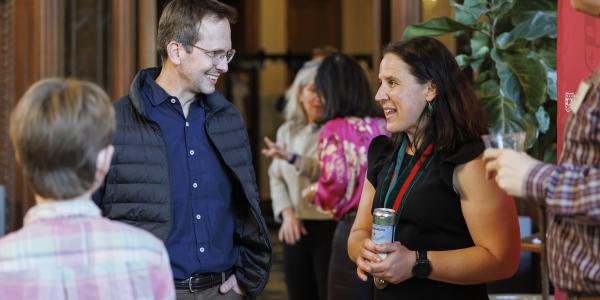During her installation ceremony on April 17, Betsy Sinclair, the Thomas F. Eagleton University Professor of Public Affairs and Political Science, delivered an address titled “The Social Citizen.”

Betsy Sinclair was installed as the Thomas F. Eagleton University Professor of Public Affairs and Political Science on April 17. The program included a welcome from Feng Sheng Hu, the Richard G. Engelsmann Dean of Arts & Sciences and Lucille P. Markey Distinguished Professor; remarks from Margit Tavits, the Dr. William Taussig Professor in Arts & Sciences; and a medallion presentation by Chancellor Andrew D. Martin.
The professorship honors the late U.S. Senator Thomas Eagleton, whose wife, Barbara Eagleton, attended the ceremony and was acknowledged in Martin’s remarks.
In her address, Sinclair, whose work focuses, in part, on voting technology and behaviors, emphasized the impact of familiarity on people’s willingness to help one another, both personally and politically. Get-out-the-vote efforts, for example, are far more effective when handled by neighbors rather than strangers.
It’s more important than ever to have a science-based understanding of how we build community and elect governments, she said. “We can see through randomized trials, through the best science we can do, that these social influences are real, and that it matters when building a democracy that these individual actions add up,” she said. “It's an accumulation of these small choices that we make each day to decide to be governed and to raise our voices together.”
Sinclair thanked her family, her colleagues and staff, and the administrators who came “to celebrate these moments of academic excellence and hope.”

About Betsy Sinclair
Betsy Sinclair is the Thomas F. Eagleton University Professor of Public Affairs and Political Science, chair of political science, and assistant vice provost for digital transformation at WashU. Previous service at the university has included a term as co-director for the Incubator for Transdisciplinary Futures and president of the Society of Political Methodology.
Sinclair is known for her pioneering work at the intersection of technology and political behavior. Her work focuses on how politics influence social relationships, and her recent research measures language patterns of elected representatives to understand dynamics of power and influence.
Starting her career as part of the Caltech/MIT Voting Technology Project, Sinclair’s scholarship in voting and elections has ranged from evaluating the consequences of different voting technologies to building a nuanced understanding of institutions that increase trust in government. Her work has informed public policies on election reform and resilient political institutions. Sinclair is a fellow for the Society of Political Methodology and serves on the editorial boards of several political and public policy journals, including the American Journal of Political Science and the Journal of Behavioral Public Administration. Her research has been funded by several grants from the National Science Foundation and the Weidenbaum Center on the Economy, Government and Public Policy. She has authored two books, including The Social Citizen, winner of the Gladys M. Kammerer Award from the American Political Science Association.
Sinclair earned an undergraduate degree in mathematics and economics from the University of Redlands and a PhD in social science from the California Institute of Technology. She and her husband, WashU economist Brian Rogers, live in St. Louis with their three children.
About Thomas F. Eagleton
Established in 1985, this professorship celebrates the years of service that Thomas F. Eagleton, U.S. senator from Missouri from 1968 until 1987, provided to the people of Missouri.
A native of St. Louis, Eagleton received a bachelor’s degree from Amherst College and a law degree from Harvard Law School. He entered politics at the age of 27 and was elected St. Louis circuit attorney in 1956. In rapid succession he was elected Missouri’s attorney general in 1960, lieutenant governor in 1964, and then U.S. senator for the first of his three terms in 1968. He has the distinction of being the youngest person ever elected to the first three of these offices.
On Capitol Hill, Eagleton was an active legislator. He was floor manager for Senate passage of the Clean Air and Water Acts and in 1973 sponsored the Eagleton Amendment, which cut funding for bombing in Cambodia and effectively ended U.S. involvement in the Vietnam War. His tenure in the Senate included membership on the Committees on Foreign Relations, Health and Education, Labor, and Appropriations, as well as the Select Committees on Ethics and Intelligence.





